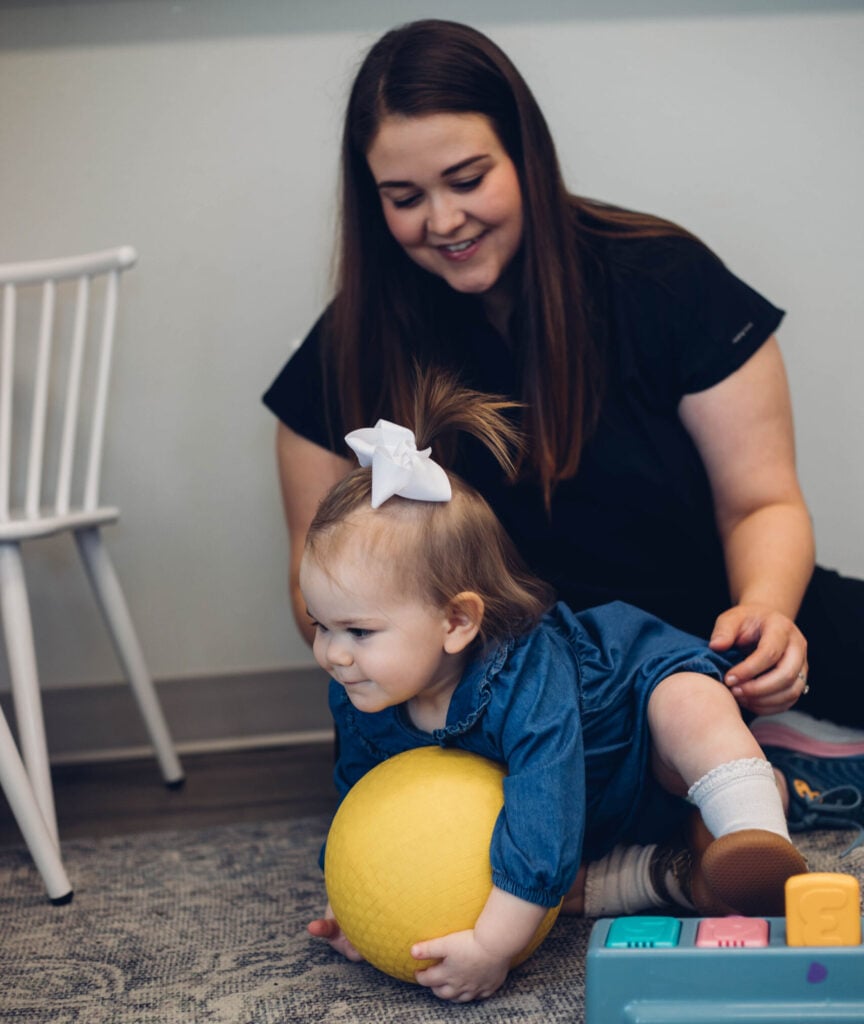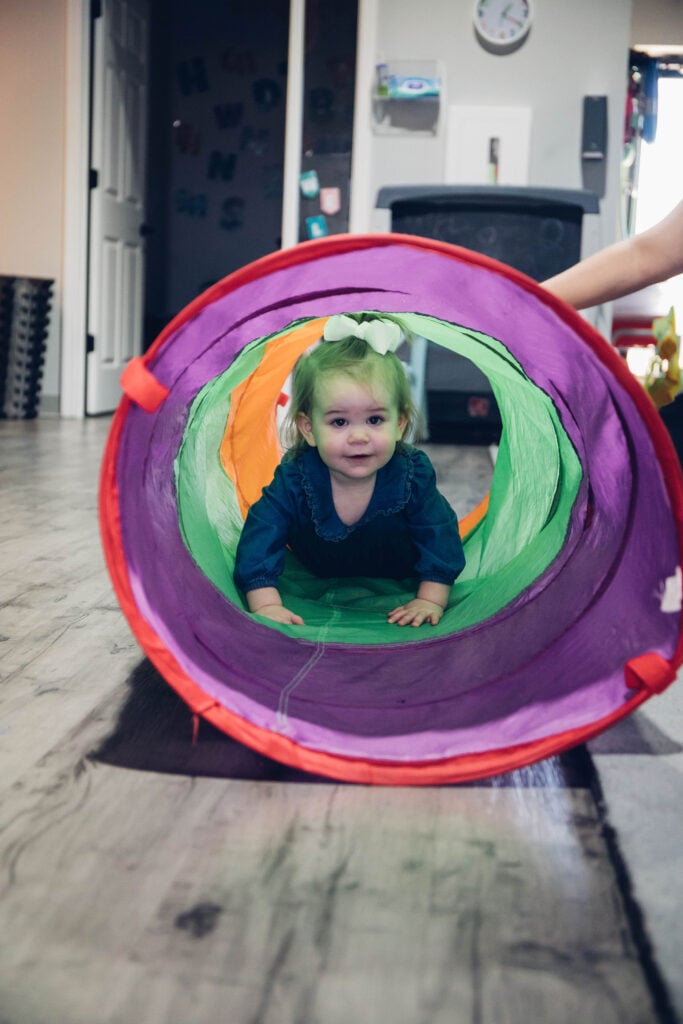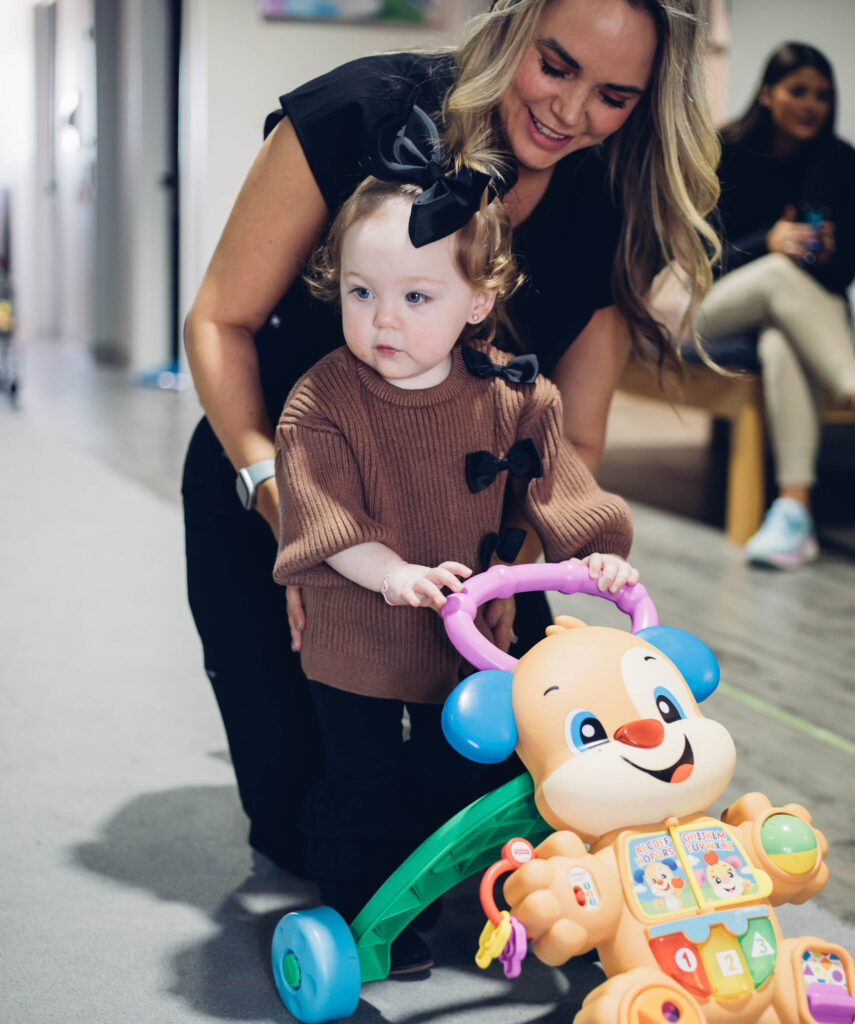
The main goal of pediatric physical therapy is to help children improve their strength, flexibility, range of motion, and control over their bodies. At Pediatric Therapy Partners, our therapists will evaluate your child’s current skills and limitations and design a treatment program that addresses their needs and circumstances. The best part is that pediatric physical therapy is a fun, playful time in which children love to participate!
Does My Child Need Physical Therapy?

If you are concerned about your child’s physical development, you should consult your child’s pediatrician and get their opinion. You can also call us at (318) 746-1199 and ask about our free developmental screening, and our therapists will be happy to go over your child’s difficulties and advise you if pediatric physical therapy will benefit them.
The following are signs that your child may need physical therapy:
- They have a genetic, nerve, muscular, skeletal, or other condition that impacts their movement.
- They have poor coordination.
- They are generally clumsy or struggle with balance.
- They are recovering from a recent surgery or injury.
- They have a limb abnormality or amputation.
- They need assistive devices for movement, like a wheelchair or prosthetic.
- Their muscles are weak.
- Their limbs are either floppy or too stiff.
What Is a Physical Therapy Session Like?
Our physical therapy sessions will look and feel a lot like playtime. They are designed to help children improve their skills one step at a time. This means that the activities will be appropriately challenging — not too easy or too hard, but just enough to give your child that feeling of pride when they accomplish a goal. And these activities are fun, so your child will feel like they are playing games while they learn and grow!
The activities our therapists will do with your child are specifically chosen to target their needs, goals, and interests. For example, a child who struggles with balance may want to go play with other children, but they feel afraid to try because they tend to fall down or get hurt.
Our pediatric physical therapists will evaluate what is causing the child’s difficulty with balancing and develop activities and exercises that will help to improve the child’s control. As the child gains more skill in balancing, we will increase the difficulty of our activities appropriately. With patience, practice, and lots of encouragement, we can help the child learn how to balance. And once they realize that they can do it, children are more motivated and confident to reach for their goals!

How Do I Schedule a Physical Therapy Evaluation?

Our therapists will need a referral from your child’s pediatrician to evaluate and treat your child. If you don’t have one, don’t worry! Our staff can help coordinate this and get you a referral so your child can receive treatment.
When you’re ready to make an appointment for your child, call our office at (318) 746-1199 to speak to our Intake Coordinator. She will be able to answer your questions, and she will send you an email with online forms to fill out.
Once you have completely filled out the forms, including your insurance information, our Intake Coordinator will contact you to schedule your child’s initial evaluation appointment and go over any other important details with you.
Ready to get started? Call us at (318) 746-1199 today!
Amazing team of therapists! We have seen such an improvement with my daughter’s balance/coordination and fine motor skills since we started in September. My daughter looks forward to therapy day!
Hands down the nicest most helpful staff! My daughter has only been going for a short time and I already see great improvement! So thankful!
Pediatric Physical Therapy Frequently Asked Questions
How would I know my child needs physical therapy?
If your child is struggling with their physical development, physical therapy can help. Some of the signs that may indicate a need for pediatric physical therapy include:
- Difficulty with Movements: If your child is struggling with basic movements like crawling, walking, or running, it could be a sign that their muscles, coordination, or balance need some extra support.
- Frequent Falls: If your little one seems to fall more often than other kids their age or appears unsteady on their feet, physical therapy may improve their balance and stability.
- Delays in Milestones: If your child isn’t reaching physical milestones like rolling over, sitting up, or standing at the expected ages, seeking evaluation and support from a physical therapist is recommended.
- Medical Conditions or Injuries: Children with cerebral palsy, muscular dystrophy, or other conditions that affect movement could benefit from physical therapy. Similarly, if your child has experienced an injury that impacts their mobility, physical therapy may support their recovery.
- Changes in Behavior or Abilities: If you notice sudden changes in your child’s movement patterns, posture, or abilities, consult with a doctor or a physical therapist for guidance.
Early intervention can make a lasting positive impact on your child’s physical development. If you notice any of the signs described above, consult with a healthcare professional or a physical therapist for expert guidance tailored to your child’s unique needs.
What is the difference between pediatric occupational therapy and physical therapy?
Both pediatric occupational therapy and physical therapy play pivotal roles in enhancing children’s well-being, but they target distinct aspects of development. Pediatric occupational therapy focuses on honing everyday life skills that are essential for children’s independence and well-rounded growth. Occupational therapists work with children to conquer challenges related to fine motor skills, sensory sensitivities, and cognitive abilities. Through activities that involve writing, dressing, feeding, and other daily tasks, occupational therapy aims to enhance children’s overall functionality and self-sufficiency. It also addresses sensory integration, attention, and handwriting difficulties, helping children navigate the demands of daily life more effectively.
Pediatric physical therapy centers on refining children’s gross motor skills and movement capabilities. Physical therapists assist children in areas such as walking, running, balance, and overall physical mobility. Their focus is on improving coordination, strength, and balance to ensure that children can engage in various physical activities comfortably. Pediatric physical therapy is particularly beneficial for children recovering from injuries, surgeries, or medical conditions that affect their movement and physical capabilities.
In essence, while both therapies significantly contribute to children’s growth and development, they have specialized scopes. Consulting healthcare professionals can provide valuable insights into which therapy best suits a child’s unique needs and supports their holistic well-being.
At what age should my child start physical therapy?
Determining the perfect time for your child to begin physical therapy depends on their unique needs and developmental stage. Some little ones could benefit from early intervention—even as young as a few months old. This is especially true if they’re experiencing delays in essential motor milestones like sitting up, crawling, or walking. For others, physical therapy might be more suitable when they’re toddlers, preschoolers, or even a bit older.
If you notice that your child is facing challenges with basic movements, coordination, or balance, it’s best to seek advice from a healthcare professional or a physical therapist. They can evaluate your child’s abilities and determine if and when they can benefit from physical therapy. Early intervention can help address challenges before they become more significant, and it can support your child’s physical development in the crucial early years. Remember, every child is unique, so seeking professional guidance can help you discover the best time to start physical therapy tailored to your child’s specific situation.
Is pediatric physical therapy covered by insurance?
Insurance coverage for pediatric physical therapy can vary depending on various factors. The good news is that many insurance plans include coverage for pediatric physical therapy, but the extent of coverage depends on the specifics of your individual plan. Carefully review your insurance policy and reach out to your provider for guidance.
Pediatric physical therapy is often covered when the therapy is deemed medically necessary due to a child’s condition, injury, or developmental delay. Some insurance plans may have specific requirements for coverage, like a doctor’s referral or formal evaluation. It’s wise to check if the physical therapy clinic you’re considering is in-network with your insurance provider. They might have expertise in dealing with insurance matters and can guide you throughout the process.
Is a referral required for my child to start physical therapy?
Getting a referral from a healthcare professional, like a pediatrician or a specialist, is a great first step on your child’s physical therapy journey. A referral ensures your child’s medical history, challenges, and needs are properly communicated to the physical therapist. In turn, this helps the physical therapist understand the specific goals and concerns for your child’s therapy. In some cases, a referral is absolutely necessary if local regulations require it.
If you’re considering physical therapy for your child, consult with your child’s doctor. It’s the best way to determine whether a referral is necessary based on your child’s individual circumstances. A referral may also impact your child’s insurance coverage, so check with both your healthcare provider and insurance company to make informed decisions about your child’s physical therapy journey.
